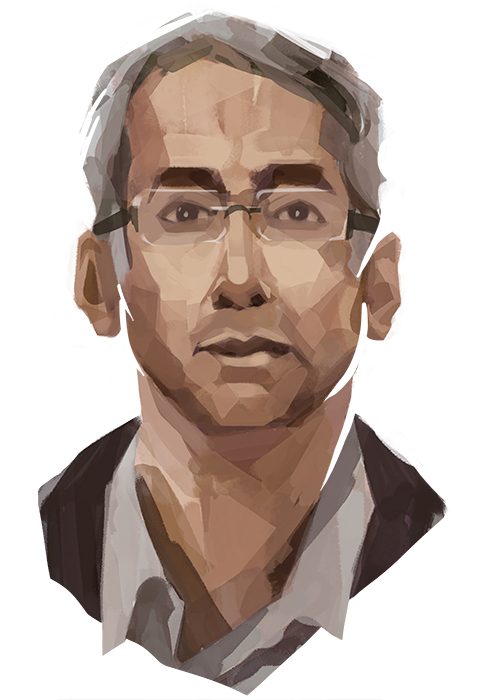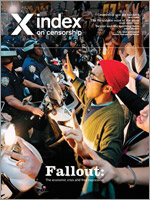13 Aug 2013 | News and features, United Arab Emirates

Authorities in the United Arab Emirates (UAE) are making transnational attempts to shut down a site belonging to the United States’ largest Arab-American newspaper, al-Watan.
The UAE’s Telecom Regularity Authority has sent a letter to watan.com’s German hosting company demanding the site be shut down, alleging that it is owned by the ‘Global Muslim Brotherhood Union’. The site’s founder Nezam Mahdawi denies this, claiming that they are being targeted due to reporting of human rights violations in the UAE.
Al-Watan is a popular news site in the Arab world, receiving over 120,000 pageviews per day, and is known for its liberal secular stance when reporting on political developments in the Middle East from its base in the United States. The site, which is banned in the UAE and other Gulf states, reports freely on sensitive political issues that domestic media are unable to broach due to censorship laws.
The UAE is ranked 114th for press freedom by Reporters Without Borders. Political parties are banned in the UAE and when a forum discussing political reform became popular in 2011 it was swiftly shut down along with the site’s owner put in prison for insulting the president. Social media sites have seen much criticism of the authorities, which led to a new Cybercrimes Decree being passed in September 2012 outlawing the use of information technology to criticize the government.
The increased chill on free speech stems from a March 2011 petition calling for democratic reform in the shape of a wholly elected parliament with full legislative powers. Those supporting reform are smeared as Muslim Brotherhood conspirators in a crude attempt by authorities to turn the public against anyone who questions their autocratic powers.
As al-Watan’s founder Nezam Mahdawi says: “if you criticize human rights violations in the UAE the authorities label you Muslim Brotherhood”. Mahdawi has also been personally targeted, with Emirati authorities hacking his personal email account and threatening to publish photos of his daughter should he refuse to close his news site. These attempts to shut down watan.com contradict the image of a country whose rulers try very hard to project as liberal and progressive.
It is worth noting that authorities have not blocked any English language news sites that criticize the government yet have aggressively pursued the Arabic al-Watan. Dr. Matt J Duffy, an expert on media law in the Middle East, believes this “allows the government to feign the appearance of plurality of opinion to the English-speaking audience”. The reality of the situation is that the UAE is neither liberal nor progressive when it comes to dealing with those who wish to criticize human rights violations or call for democratic reforms.
The attacks on al-Watan are a clear attempt to take the UAE’s free speech restrictions beyond its own borders. Thankfully the site is still running although the German hosting company, Hetzner Online AG, has yet to respond to al-Watan’s letter asking for the site not to be shut down.
Al-Watan provides a crucial platform for news to be reported in Arabic to a Middle East audience bereft of newspapers. It is easy to see why the UAE, with one of the highest per capita rates of political prisoners in the region, would want to shutdown a website that exposes their abuses.
The UAE enjoys an international image of being seen as liberal and progressive, belying the reality of a country becoming a police state. This is why it is so important that the hosting company of watan.com resist pressure from authorities to shut it down and why international media should highlight the plight of the United States’ largest Arab-American newspaper.
This article was originally published on 13 Aug, 2013 at indexoncensorship.org. Index on Censorship: The voice of free expression.
13 Aug 2013 | In the News
#DONTSPYONME
Tell Europe’s leaders to stop mass surveillance #dontspyonme
Index on Censorship launches a petition calling on European Union Heads of Government to stop the US, UK and other governments from carrying out mass surveillance. We want to use public pressure to ensure Europe’s leaders put on the record their opposition to mass surveillance. They must place this issue firmly on the agenda for the next European Council Summit in October so action can be taken to stop this attack on the basic human right of free speech and privacy.
(Index on Censorship)
CANADA
Censorship Can’t be Our Default Internet Setting
Who should decide what websites you can access online? The answer is obvious: You.
(Huffington Post)
CHINA
What a murder mystery reveals about Chinese censorship
At first glance, the only thing out of place in the photograph of a dim, dingy bedroom in Kabul, Afghanistan, released last week by Xinhua, China’s state-controlled news agency, is the giant fluorescent bulb hanging inexplicably below a gilded, five-branch chandelier. It is not: the room is a crime scene, the place where, this past Thursday, an attack left three Chinese nationals dead and two more people missing.
(The New Yorker)
How Censorship Hurts Chinese Internet Companies
Beijing’s block of Facebook, YouTube, and Twitter has allowed domestic equivalents to grow. But by shunning global markets, their long-term outlook is uncertain.
(The Atlantic)
INDIA
Indian court orders Facebook, Google to offer plans for protecting children
The New Delhi High Court has given Facebook and Google one month to submit suggestions on how minors can be protected online in India.
(Index on Censorship)
Freedom of Expression: Indians are Becoming Increasingly Intolerant
Instead of nurturing the spirit of debate, we have become aggressive, bigoted and abusive
(Forbes India)
TAIWAN
Censorship quietly flourishes amid outrage
Taiwan’s once-famously freewheeling press is becoming more reliant on China as cross-strait cultural and media exchanges grow
(Index on Censorship)
UKRAINE
TVA channel still off the air, censorship suspected
Nearly three weeks after local TVA channel was forced to suspend its broadcast, a group of 28 deputies from local councils of Chernivtsi Oblast asked the National Council on Television and Radio Broadcasting to intervene.
(Kyiv Post)
UNITED KINGDOM
Artificially inadequate: we should never let machines rule on censorship
One of the great irritations about freedom of speech is that the people who demand it most are the ones who deserve it least. The very worst, I reckon, are the oxygen thieves who demand complete freedom for themselves but try to silence others.
(TechRadar)
UNITED STATES
The Business of Financing Hate Groups: Legal to Censor, but Unwise
It’s so tempting to go for the easy answer. Credit card companies are private businesses. They generally have the right, including possibly the First Amendment right, to refuse to deal with anyone. (Exceptions might include a collusive financial blockade of any group, which could violate antitrust law, and of course there are anti-discrimination laws.) That should apply all the more to bigots, right?
(ACLU)
Strip Club Owner Brings Epic Free Speech Fight To The US Supreme Court
The owner of an Albany, N.Y. strip club called Nite Moves has hired one of America’s best free speech lawyers to help him convince the Supreme Court that taxes on lap dances should be illegal, The Daily Gazette reports.
(Business Insider)
Previous Free Expression in the News posts
Aug 12 |Aug 9 |Aug 7 |
Aug 6 | Aug 5 | Aug 2 | Aug 1 | July 31 | July 30 | July 29 | July 26 | July 25 | July 24 | July 23 | July 22 | July 19 | July 18 | July 17
12 Aug 2013 | Asia and Pacific, China, News and features, Politics and Society, Taiwan

Activists and civic groups march in Taipei in protest against the Want Want China Times Group’s planned acquisition of China Network Systems’s cable TV services in Sept 2012.
(Photo: Craig Ferguson / Demotix)
The connections between China and Taiwanese media owners has given rise to concerns, along with some evidence, that the industry is under growing pressure to curb reporting on topics detrimental to Chinese interests and cross-strait ties.
The capital, Taipei, erupted in protests when it became known that Tsai Eng-ming, a pro-Beijing businessman, attempted to wrest control of Taiwan’s largest newspaper, the Apple Daily, earlier this year. The attempt failed amid popular outrage. But conversations with several journalists suggest that Beijing continues to exert a quieter influence – involving self-censorship and lucrative business interests – in attempt to avoid further scrutiny.
This is perhaps most prominent at the China Times Group, a Taiwanese media conglomerate that Tsai purchased in 2008. Estimated to be worth up to US$10.6 billion, the snack manufacturer has since led its subsidiaries to become more China-friendly, accepting payment from Beijing in return for camouflaged advertising and one-sided reporting. His flagship daily, the China Times, has been fined multiple times by Taiwan’s media regulators for masquerading advertising as reporting.
“It happens far more frequently than most people realize,” said Lin Chao-yi, the former head of the Association of Taiwan Journalists, that uncovered one such example last year. After receiving a copy of a schedule detailing how a visit from a ranking Chinese official was to be covered, including pre-defined topics and article lengths, Lin then impersonated a China Times employee to ask the delegation how the paper was going to be compensated.
Caught on tape, the Chinese press officer replied that the payment would be wired to a China Times Group subsidiary in Beijing. But far from discouraging such deals from taking place again, Lin said that his report “just made them more careful.” Indeed, accepting Chinese money is not only lucrative business, but also allows the paper to stay on Beijing’s good graces – guaranteeing access from behind China’s Great Firewall – according to sources familiar with the relationship.
The China Times Group’s cosy relationship with Beijing has led some journalists working under its banner to become more aware of what might, and might not, be publishable. Speaking on the condition of anonymity, one China Times reporter said that, there is an “unspoken understanding” of what articles or reports might contradict the paper’s political viewpoint, including, for example, pieces critical of either Beijing or Taiwan’s China-friendly president, Ma Ying-jeou.
“In these cases, we might choose to just drop the subject, instead of choosing to pursue it further,” the reporter said, in words reminiscent of the self-censorship taking place elsewhere in the Chinese-speaking region.
But far from taking place only at the China Times Group, self-censorship is also seen as a necessity by other media groups keen on maintaining access to the Chinese market. Much of this has to do with Taiwan’s highly profitable entertainment industry that feeds thousands of hours of programming each year into local Chinese television channels. Produced by the same media groups that also run cable news stations, coverage of some politically sensitive topics, such as the Dalai Lama or the Falungong movement, are toned down to avoid antagonizing Beijing.
“China uses its vast market as a bargaining chip,” said Cheryl Lai, the former editor-in-chief of the state run Central News Agency, adding that most of this takes place secretly and away from public scrutiny. “They know that most of these media companies are in it for the money. All they have to do is threaten to cut it off.”
The trend towards greater Chinese influence in the media is reflective of the realization that its political objectives of unifying Taiwan, which it claims to be a breakaway province, can be achieved cheaper and more effectively through propaganda, rather than force. Instead of “spilling blood on Taiwan,” an old rallying call for conquering the island by force if necessary, Beijing has deemed it easier to “spill money on Taiwan,” said Lai, who has been writing on China’s growing political sway on the island.
The same trend can be seen elsewhere where China holds political interests, such as Hong Kong, where a large number of publications are ostensibly under its influence. The South China Morning Post, for example, has reportedly been hit by allegations of self-censorship after the appointment of new Editor-in-Chief Wang Xiangwei, a member of the Chinese People’s Political Consultative Congress, a Chinese government body.
In Taiwan, even as most media interests are controlled by large corporations, some with extensive business ties to China, there is, however also a realization that hard-fought press freedoms must be protected. More than 100,000 protestors, including students and reporters, rallied in defence of the Apple Daily during the failed purchase in January this year, with some groups vowing to raise the equivalent funds if it meant protecting the paper’s journalistic integrity.
All this is reason why Beijing is likely to continue and incubate its media influence behind the scenes, at least for now.
12 Aug 2013 | News and features
Writer and broadcaster Kenan Malik and art historian and educator Nada Shabout on one of the art world’s most contentious debates


Mark Boardman/www.mark-boardman.com
Dear Nada,
I regard free speech as a fundamental good, the fullest extension of which is necessary for democratic life and for the development of other liberties. Others view speech as a luxury rather than as a necessity, or at least as merely one right among others, and not a particularly important one. Speech from this perspective needs to be restrained not as an exception but as the norm.
The answer to whether religious and cultural sensibilities should ever limit free expression depends upon which of these ways we think of free speech. For those, like me, who look upon free speech as a fundamental good, no degree of cultural or religious discomfort can be reason for censorship. There is no free speech without the ability to offendreligious and cultural sensibilities.
For those for whom free speech is more a luxury than a necessity, censorship is a vital tool in maintaining social peace and order. Perhaps the key argument made in defence of the idea of censorship to protect cultural and religious sensibilities is that speech must necessarily be less free in a plural society. In such a society, so the argument runs, we need to police public discourse about different cultures and beliefs both to minimise friction and to protect the dignity of individuals, particularly from minority communities. As the sociologist Tariq Modood has put it, “if people are to occupy the same political space without conflict, they mutually have to limit the extent to which they subject each others’ fundamental beliefs to criticism”.
I take the opposite view. It is precisely because we do live in a plural society that we need the fullest extension possible of free speech. In such societies it is both inevitable and important that people offend the sensibilities of others. Inevitable, because where different beliefs are deeply held, clashes are unavoidable. And they should be openly resolved, rather than suppressed in the name of “respect” or “tolerance”.
But more than this: the giving of offence is not just inevitable, but also important. Any kind of social change or social progress means offending some deeply-held sensibilities. Or to put it another way: “You can’t say that!” is all too often the response of those in power to having their power challenged. The notion that it is wrong to offend cultural or religious sensibilities suggests that certain beliefs are so important that they should be put beyond the possibility of being insulted or caricatured or even questioned. The importance of the principle of free speech is precisely that it provides a permanent challenge to the idea that some questions are beyond contention, and hence acts as a permanent challenge to authority. The right to “subject each others’ fundamental beliefs to criticism” is the bedrock of an open, diverse society, and the basis of promoting justice and liberties in such societies. Once we give up such a right we constrain our ability to challenge those in power, and therefore to challenge injustice.
The question we should ask ourselves, therefore, is not “should religious and cultural sensibilities ever limit free expression?” It is, rather, “should we ever allow religious and cultural sensibilities to limit our ability to challenge power and authority?”
Best wishes,
Kenan

Mark Boardman/www.mark-boardman.com
Dear Kenan,
I too regard free speech as a fundamental good and as necessary. On the surface, thus, the simple and direct answer to the question of whether religious and cultural sensibilities should ever limit free expression should be an unequivocal NO! However, the reality is that the question itself is problematic. While free expression, and let’s think of art in this specific case, will always push the limits and “reveal the hidden”, consideration and sensitivity, including religious and cultural sensibility, should not be inherently in opposition. By positioning it as such, the answer can only be reactive. I thus disagree with your argument.
A quick note on “censorship”. Yes, we all hate the word and find it very offensive. It is a word loaded with oppression, but the reality is that censorship in some form exists in every facet of life, personal and public. It is not that one needs to restrict speech in a plural society but that this plurality needs to find a peaceful way of co-existing with respect and acceptance, as much as possible — not tolerance; I personally abhor the word tolerance and find that it generally masks hatred and disdain. No belief is above criticism and nothing should limit our ability to challenge power and authority.
I suppose one needs to decide first the point of this criticism/free expression. Does it have a specific message or reason, and how best to deliver it — or is it simply someone’s personal free expression in the absolute? And if it is someone’s right to free expression, then why is it privileged above someone else’s right — religious and cultural sensibility being someone’s right to expression as well?
For example, and I will use art again, there is a problem when art/the artist is privileged as “genius”, with rights above other citizens — except not really, since the artist is subject to other limitations that may not be religious or cultural, like those of the tradition of expression, funding, law and so on. This is not to say that a religion should dictate expression. We should remember, though, that the marvel of what we call Islamic art was achieved within full respect of Islamic religious sensibilities, but also pushed the limits and critiqued simplicity in interpreting these sensibilities.
Perhaps my view here is less idealistic and more practical, but I see many unnecessary attacks on all sides that do not accomplish anything other than insult and inflame. All I’m saying is that expression is always achieved through negotiations, including limitations.
All the best,
Nada
Dear Nada,
I’m afraid that I was no clearer at the end of your letter than I was at the beginning about your actual stance on free speech. You say you ‘regard free speech as a fundamental good’ and that the answer to “whether religious and cultural sensibilities should ever limit free expression should be an unequivocal NO!” You then, however, go on seemingly to qualify that unequivocal stance but without actually specifying what it is that you wish to qualify. Where should the line be drawn when it comes to the issue of what is and is not legitimate free speech? Who should draw that line? And on what basis? These are the critical questions that need answering. You write: “It is not that one needs to restrict speech in a plural society but that this plurality needs to find a peaceful way of co-existing with respect and acceptance”. It’s a wonderful sentiment, but what does it actually mean in practice? Should Salman Rushdie not have written The Satanic Verses so that he could find “a peaceful way of coexisting with respect and acceptance”? Was the Birmingham Rep right to drop Gurpreet Kaur Bhatti’s play Behzti after protests from Sikhs? Should Jerry Springer: The Opera ever have been staged (or broadcast)?
You suggest that “one needs to decide first the point of this criticism/free expression. Does it have a specific message or reason, and how best to deliver it — or is it simply someone’s personal free expression in the absolute?” Again, I am unclear as to the point you’re making here. Are you suggesting here that speech is only legitimate if it has “a specific message or reason”? If so,who decides whether it does? During the controversy over The Satanic Verses, the philosopher Shabbir Akhtar distinguished between “sound historical criticism” and “scurrilously imaginative writing”, and insisted that Rushdie’s novel fell on the wrong side of the line. Do you agree with him? If not, why not? You ask: “If it is someone’s right to free expression, then why is it privileged above someone else’s right — religious and cultural sensibility being someone’s right to expression as well?” This seems to me a meaningless question. A “sensibility” is not a “right”, still less a “right to expression”. If your point is that all people, whatever their religious or cultural beliefs, should have the right to express those beliefs, then I agree with you. That is the core of my argument. What they do not have is the “right” to prevent anybody expressing their views because those views might offend their “sensibilities”.
A final point: to defend the right of X to speak as he or she wishes is not the same as defending the wisdom of X using speech in a particular fashion, still less the same as defending the content of his or her speech. Take, for instance, The Innocence of Muslims, the risibly crude and bigoted anti-Muslim video that provoked so much controversy and violence last year. I would defend the right of such a film to be made. But I would also question the wisdom of making it, and would strongly challenge the sentiments expressed in it. There is a distinction to be drawn, in other words, between the right to something and the wisdom of exercising that right in particular ways. It is a distinction that critics of free speech too often fail to understand.
Best,
Kenan
Dear Kenan,
Nicely said! I believe we are ultimately saying the same thing. It is that “distinction” that you outline in your last paragraph that I call a negotiation between all sides, cultures, etc. My answer is not clear because the issue is not simple! I am saying that it is not a black and white binary divide nor can one “draw a line”. And yes, “who should draw that line? and on what basis?” is critical and essential. I believe that should be reached through negotiation. The “wisdom” of something to exist is as important as its right to exist. But there is also the question of responsibility. Free speech cannot be “inherently good” or bad. The person who utters that speech must claim responsibility for its use and effects. The examples you cite above are not all equal. Yes, they all have the right to exist. But let’s think a bit about the Danish cartoons about the Prophet Mohammed as another example. Were they not an attack aimed to inflame Muslim communities? Was it not part of Islamophobia?
Was the aim not to ridicule and play off people’s fears and prejudices? How were they a critique of Islam? What was the point? It is not that “it is morally unacceptable to cause offence to other cultures” as you once said, but the how and why are just as important as the right to cause that offence. I agree with you that the fear of consequences has become a limitation, but that isperhaps because free speech has been abused.
Perhaps I am looking at this from a different point of view. As an educator, I often face the situation, equally here in the US and in the Middle East, of how to argue a point that has become of specific cultural/religious/political sensitivity to my students. If I offend them here, they will stop listening; in the Middle East, I will not be allowed to continue. What would I gain by doing that? By negotiation I test the limits and push gently. At least in academia, I think we are at a point where we have to teach our students to not get offended by an opposing opinion and to be able to accept various opinions and to be able to accept criticism. I don’t think I can achieve that through shock alone!
Best, Nada
Dear Nada
You write that your “answer is not clear because the issue is not simple”. Perhaps. But surely, if the answer is not simple, that only places a greater imperative to make one’s answers as clear as possible?
You believe that we are “ultimately saying the same thing”. I am not so sure that we are. So, let us try to work out where we do agree and where we don’t.
There are two questions we are debating. The first is about the legal limits to free speech. My view is that the law should not in any way protect cultural or religious sensibilities. All speech should be legal except where it directly incites violence. I assume that is your position, though you have never actually stated it as such. Do we agree on that?
The second question is about how we can define speech that is legally acceptable but morally distasteful. You say that where we draw the moral line “should be reached through negotiation”. But negotiation with whom? And on what basis?
You raise a series of questions about the Danish cartoons, and imply that the cartoons were not legitimate speech but created merely to provoke, and hence should not have been published. You don’t, however, actually say that. So, to clarify, is that your view?
Exactly the same questions were, as I pointed out in an earlier letter, asked about The Satanic Verses, and many came to the same conclusions about Rushdie’s novel: that it was Islamophobic, designed to provoke and inflame Muslim communities, that it ridiculed Islam and played off people’s fears, and so on. The philosopher Shabbir Akhtar described it as an “inferior piece of hate literature”. The liberal Ziauddin Sardar wrote that reading the novel felt like being “raped”. The novelist Rana Kabani insisted that it played upon ancient Islamophobic stereotypes.
In the case of both The Satanic Verses and the Danish cartoons, the majority of Muslims, certainly initially, stayed indifferent to the issue. A vocal minority transformed both into global controversies. So, what does “negotiation” mean in this context? Muslim objection to The Satanic Verses was as deep and as broad as that to the Danish cartoons. Yet, you seem to think that it was right to publish the novel but not the cartoons. Why? And please don’t say “My answer can’t be clear because the issue is not simple”.
In any case, the questions that you raise — Is it Islamophobic? Is the aim merely to ridicule? etc — are different from the question that we are actually addressing: “Should religious or cultural sensibilities ever limit free speech?”. There is, in my view, a moral imperative on free speech advocates to challenge racist and other bigoted speech. I certainly do not that think that about speech that offends cultural or religious sensibilities. On the contrary, the moral imperative is often to transgress such boundaries. It is the conflation of racism and bigotry, on the one hand, and of cultural and religious sensibilities, on the other, that is the problem. Opponents of free speech often conflate these two issues in an attempt to establish a spurious legitimacy for their arguments against the giving of offence.
Best wishes,
Kenan
Kenan Malik is a writer and broadcaster. His latest book is From Fatwa to Jihad: The Rushdie Affair and its Legacy (Atlantic Books)
Nada Shabout is associate professor of art education and art history at the University of North Texas and director of the Contemporary Arab and Muslim Cultural Studies Institute







